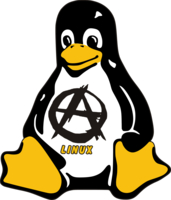Difference between revisions of "Bristol Anarchist Bookfair 2015 Talk"
| Line 23: | Line 23: | ||
{| | {| | ||
| − | ! | + | ! Element !! Free Software !! Open Source Software |
|- | |- | ||
| − | | Support for the four freedoms | + | !colspan=3|Support for the four freedoms |
|- | |- | ||
| − | | Response to DRM | + | | 0. The freedom to run the program. |
| + | |- | ||
| + | | 1. The freedom to study how the program works, and change it. | ||
| + | |- | ||
| + | | 2. The freedom to redistribute copies. | ||
| + | |- | ||
| + | | 3. The freedom to distribute copies of your modified versions to others | ||
| + | |||
| + | | | ||
| + | |- | ||
| + | !colspan=3|Response to DRM | ||
|- | |- | ||
| | | | ||
Revision as of 09:23, 15 February 2015
The Free Software Movement: what lessons could the anarchist movement learn?
Duration: 50 minutes, talk and discussion
The Free Software movement can be said to have begun in 1983 when Richard Stallman launched the GNU project. Since then a global network of projects worked on by individuals and organisations in a largely non-hierarchical fashion has gradually infiltrated the world of proprietary software. It has been subject to successes and failures, been co-opted and has changed the information technology world from within. What parallels are there with the anarchist movement and how does it fit with anarchist philosophy? Are there any lessons to be drawn from the Free Software movement that could be useful in anarchy's approach to gaining wider acceptance?
'Free' or 'Open Source'?
"The idea that we want software to be powerful and reliable comes from the supposition that the software is designed to serve its users. If it is powerful and reliable, that means it serves them better.
But software can be said to serve its users only if it respects their freedom. What if the software is designed to put chains on its users? Then powerfulness means the chains are more constricting, and reliability that they are harder to remove. Malicious features, such as spying on the users, restricting the users, back doors, and imposed upgrades are common in proprietary software, and some open source supporters want to implement them in open source programs."
The differences between these two terms are not really understood. They have emerged as terms based on radically different philosphies. Here's a quick look at some differences.
| Element | Free Software | Open Source Software |
|---|---|---|
| Support for the four freedoms | ||
| 0. The freedom to run the program. | ||
| 1. The freedom to study how the program works, and change it. | ||
| 2. The freedom to redistribute copies. | ||
| 3. The freedom to distribute copies of your modified versions to others | ||
| Response to DRM | ||
Parallels between Free Software and Anarchist Movements
There are a number of very strong parallels between the two movements, though they share no common historical source. It must be remembered that Software as a resource can be copied virtually free of cost, whereas Anarchist movements which concern primary production deal with items which cannot be reproduced without labour.
No hierachy
There's no given structure to a Free Software project. Adoption of roles within a project is commonly ad hoc. Many projects do end up with strong leaders, though this role is by no means granted through entitlement or ownershtip, and can be as fleating as the morning mist if decisions aren't liked.
Active Resistance
Keeping software free has been a fight. It will continue to be a fight. We will ilucidate some responses to co-option and take over.
Examples:
- Sun/Oracle
- DRM responses
- Debian Anarchism
Solidarity
Free Software projects work together towards a common goal. Methods for relieving dis-unity are understood and practically applied.
Free Software as a movement has a core philosophy, based around the four freedoms. These four freedoms are there to promote social solidarity.
Mutual Aid
In Free Software results in a situation where all our labour (work on the code) is given as a resource for everyone else.
Sharing
Free softwares licensing is an attempt to allow sharing whilst preserving freedom.
Open Participation
The four freedoms apply to everyone on the planet. If we discover life on other planets, it will be apply to them too. Anyone can contribute to Free Software.
Differences between Free Software and Anarchist Movements
Why would we want to learn lessons from Free Software?
Discussion
Links
- The Free Software Definition, including The Four Freedoms - https://www.gnu.org/philosophy/free-sw.html
- Richard M Stallman on Free Sofware vs Open Source - https://www.gnu.org/philosophy/open-source-misses-the-point.html
- The Anarchism Package in Debian - https://packages.debian.org/search?keywords=anarchism
- The Anarchism FAQ (on which the Debian package is based) - http://anarchism.pageabode.com/afaq/index.html
